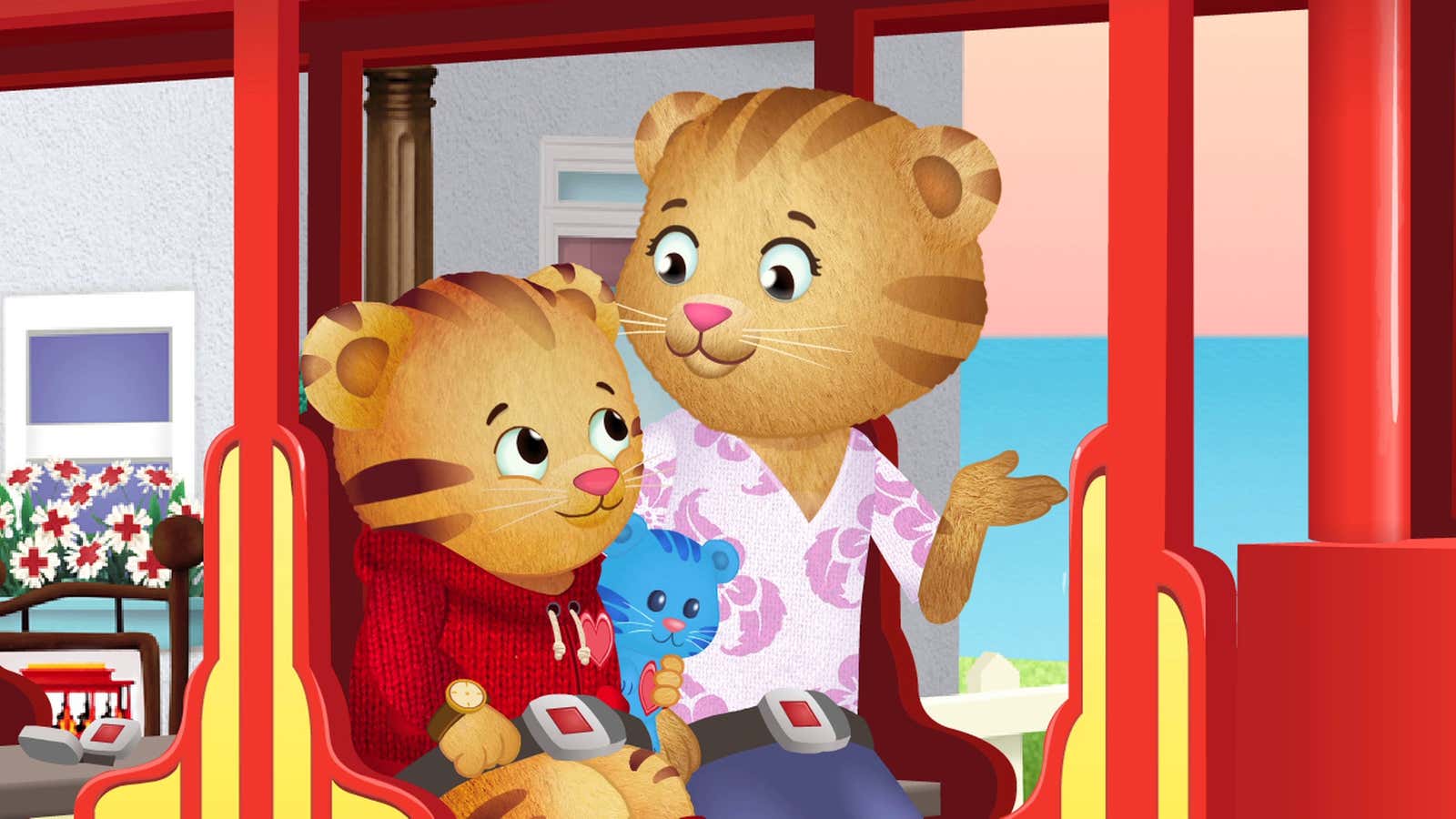Recently, on an average weekday evening, I had an average mom meltdown.
I was on my own with my 2.5-year old for the night, and it had already been a long one of dinner refusal and minor disobedience. Then there was poop all over the floor. It was my fault—I’d tugged at a pull-up diaper without sufficiently assessing its contents—and it sent her into a tizzy. I felt my vision narrow and my blood pressure spike. I was losing it.
Then, suddenly, there was a little voice in the back of my mind, singing a familiar tune.
When you feel so mad that you wanna roar / Take a deep breath! / And count to four.
I sang it—one of my daughter’s favorites from the cartoon Daniel Tiger—and then, poop in hand, had to laugh. Did I just use a preschool self-help jingle on myself? Yes I did.
Daniel Tiger, the animated kids show that debuted in 2012 on the US public TV network PBS, stars a pre-school age tiger whose personal struggles—apart from rage control—include learning to share and remembering to go to the potty before leaving home. As the IP heir to the Mr. Rogers franchise, the show carries many of the tropes, catchphrases, songs, and sensibilities that Fred Rogers built into Mr. Rogers’ Neighborhood, the beloved live-action show that ran on US public television from 1968 to 2001.
Daniel himself is the preschool-age son of the original Daniel Tiger puppet, who you may remember as inhabiting a clocktower. And other familiar characters—Lady Elaine Fairchilde and Henrietta Pussycat among them—reappear in the series as the parents of Daniel’s classmates.
The show, like Fred Rogers’ original, focuses primarily on emotional literacy for preschoolers, and some of the staffers that worked with Rogers are still involved, says series producer Chris Loggins—many of them child development experts who think carefully about the social and emotional lessons the episodes impart.
Episodes are built around simple plot lines that culminate in lessons about how to deal with the feelings created by various situations. And these lessons are delivered, without fail, in the form of jingles that range from mildly cloying to actually-if-we’re-being-honest kinda catchy. At least, they very effectively stick in the head. And this is key to their genius.
As a grownup who has read her fair share of mindfulness articles and taken more than a couple yoga classes, I know you’re supposed to take a deep breath when you feel trapped, cornered, inundated, overwhelmed, or out of control. Do I ever simply remember that, or do it instinctively? No. Not until the Daniel Tiger song pops into my head.
Parenting a toddler is a high-pressure, high-stakes gig. It presents different challenges than those you encounter when you first have a baby. With this small, increasingly demanding human who rarely naps, you definitely have less down time to Google and vet the appropriate responses to various situations (or seek the actual advice of a professional). You must make quick decisions, and execute them in real time.
Where does one turn for guidance on this? Yes, there are bookshelves full of books espousing this or that parenting philosophy, but as first-time parents, we often find ourselves trying whatever tactics we’ve managed to glean from instinct, community, or pop culture. For me, the most useful tactics come from Daniel Tiger.
I started using his mantras so much that it occurred to me that perhaps the songs aren’t just written for preschoolers—they’re also for parents who need tactics for preschooler-handling, and even for self-care. What working parent couldn’t use this piece of advice, for example?
It’s almost time to go, so choose one more thing to do!
Loggins confirmed this hunch when I talked to him: While the show caters first to 2-4 year olds, he said, the writers are definitely aware that parents and caregivers are watching along.
“The cool thing is all of these strategies can be used by preschoolers but they’re strategies that can be used throughout your life,” he said. “We’re not about telling a parent how it should be done, but there are little things in there that if a grownup can watch it and find it useful that’s great.”
Once I realized how effective this jingle-as-behavior-modification technique was, I realized there’s almost no situation a toddler (or adult human) encounters that doesn’t have a Daniel Tiger-jingle-ready solution:
Dejected by your lack of natural ability to button your own coat (or learn a new software program)?
Try try try try try again / Keep tryin! You’ll get be-eh-tter!
Frustrated at the prospect of having to interrupt this engaging play session (or team meeting) to use the facilities?
When you have to go potty / Stop! And go right away!
Irritated by that toy (or job promotion) that somehow seems always just out of reach?
When you’re feeling / Frust-a-rated / Take a step back / And ask for help!
I use these mantras constantly with my daughter, who has been known to interrupt a full-blown tantrum to sing the next line. I’ve even started repurposing old classics, with Daniel Tiger-esque cadence. With apologies to the Rolling Stones:
You can’t / always get / what you want!
And once you’re in the spirit, no highly specific circumstance is immune to jingle-ification, like this one I proudly penned myself.
No more cheese today / at least not until you poop!
